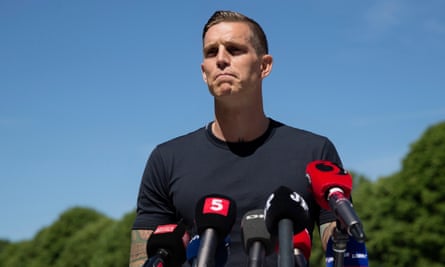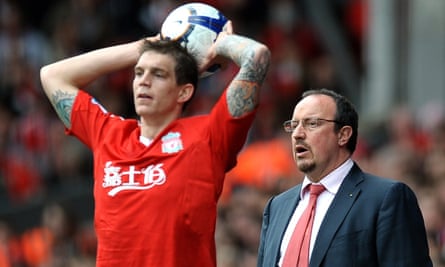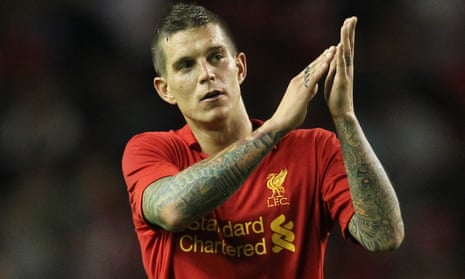The first thing Daniel Agger remembers is that he was unable to control his body. He did not feel any pain but he was just lying there shaking. Earlier that day, 8 March 2015, he had led out Brøndby to face their rivals FC Copenhagen in a Danish league game. He lasted 29 minutes before being taken off. He then collapsed and was taken to the physiotherapist’s room at Parken.
He should never have played. He was carrying a knock from the week before and, like so many times in his career, he took a lot of anti-inflammatories – far more than the recommended dosage – and his body had had enough.
He stopped taking anti-inflammatories that day and this summer, having quit football in May, aged 31, the Danish paper Jyllands-Posten published a series of interviews with the player, conducted over a two-year period, in which he opened up about his career and what he put his body through in order to play.
Agger played for Liverpool from 2006 to 2014 before rejoining Brøndby to play for another two seasons. He played 384 games in total – 232 games for Liverpool, 77 for Brøndby and 75 for Denmark – but his body gradually broke down. He now has pain in his back all the time and estimates that he was able to perform to only 70% or 80% of his capacity during his last two seasons at Liverpool and at an even lower level at Brøndby.
Agger’s main problem was he was hypermobile, meaning his joints overextended. He also started having back problems as early as 2007, which were exacerbated by an awkward fall during a pre-season trip to Thailand in 2008. He eventually suffered a prolapsed disc in his back, which led to pain in his knees and toes as well. In order to play he took anti-inflammatory drugs used to treat rheumatism, often Celebrex, and at times exceeded the recommended maximum dose, putting his health at risk.
“I have taken too much anti-inflammatories in my career,” he told Jyllands-Posten. “I know that full well, and it sucks, but I did stop it [in the end]. I am not gaining anything personally from saying this but I can only hope that other athletes do. It could be that others take a pill or two less.”

A week before that game against Copenhagen, Agger had suffered an injury and was a doubt for the match. He desperately wanted to play, so for a week he took the maximum recommended dose of the drug – two pills three times a day – despite the fact he had been told by doctors he should be on that much for only three days.
The side-effects vary from person to person and Agger often felt lethargic after taking the drug. He often compensated for this with caffeine.
He took two pills on the morning of the Copenhagen game and then two more as he arrived for the pre-game meeting at Brøndby’s stadium. He then feel asleep during the 15-minute bus journey to Parken and his team-mate Martin Ornskov woke him up. Ornskov later told Agger he had never seen anything like that before a match.
Agger still felt very sleepy so he took a caffeine shot and drank an energy drink before the warm-up. He did the normal pre-match routine but felt terrible. “I only had one thought and that was to remain in the dressing room after the warm-up but then I put the shirt on and decided to play,” he said.
He was not himself, though. His pre-match talk did not make much sense to his team-mates and he struggled with his movement on the pitch. It was as if his vision was not in sync with what was happening around him. Early on he was trying to head a long ball coming towards him but could not see it, misjudged it and it fell on his arm. After 29 minutes, he had to come off. He sat down on the substitutes’ bench but later had to be helped down to the physio room. He does not remember that at all.

That night, when he got back to his family, his wife Sofie said nothing. She did not need to. Throughout his career she had questioned whether he needed to take the medication.
“She has said it time and time again, that I should stop taking the medicine but it has gone in one ear and out the other,” Agger said. “So [when I decided to stop playing] she was pleased too because of the pain I have had and because I have taken so much [medicine] just to keep standing.”
In March 2015, Agger, who had already started to take the drug less, realised that it was time to stop altogether. “The body could not cope with it,” he said. “The maximum dose should be taken for only three days. The body reacts to what is put into it and it was my body’s way of telling me that it had had enough. When the head can’t work it out, then the body had to do it.”
A year and two months later he retired. “I am in a place where I have had enough, mentally and physically,” he said. “And it also means something to me that I feel that I can still play at a good standard. The offers I have received [to carry on] say that too. And I don’t want to embark on a downward spiral. I want to quit somewhere near the top. I have always said that that was important for me and therefore I stop now.”
Agger made his debut for Brondby as a 19-year-old in 2004 and, despite all his injury problems, played at the highest level for 12 years. It came at a cost and he hopes that by speaking out others can fully understand the dangers that come with taking too much medication.
In the interviews with Jyllands-Posten, Agger also spoke about …
Rafael Benítez
“He was, without a doubt, the best tactician I have played for. He could change formation and tactics three times in one game. We practised his different systems so we knew what to do in different ones. I also remember when we went 1-0 down against Barcelona at the Camp Nou. Benítez was there [pushing his hands downwards as to say ‘stay calm’]. A few of us panicked a little bit and thought we’d get our arses kicked but he was ice cool. He just stood there on the sidelines and said: take it easy, carry on doing what you are doing – and in the end we won 2-1.
Everton’s David Moyes watching him play a few months before he signed for Liverpool
“He had asked us whether he could meet me and my parents after the game and we said that of course he could. After the game I went back to my parents and waited for him and [and Agger’s agent] Per Steffensen to come but then Per phoned to say that David Moyes wasn’t going to come after all. He was being taken to the airport because he didn’t think that I was ready for the Premier League. A few months later I signed for Liverpool.”
Playing for Liverpool in a Champions League final and at Anfield for the first time
“The feeling you have before a Champions League final or playing at Anfield for the first time is simply impossible to explain. It can’t be explained but it should be experienced. To have so many people who spend so much money and travel so far to see a game in which you are going to play in. That is dedication and I thought a lot about that.”
Roy Hodgson
“I completely lost my desire to come to work because his training sessions were really hard to get through. Not physically but mentally. It was the same and the same and the same. Day in and day out.
“Often we had eight forwards playing against me and Martin Skrtel [apparently to let Fernando Torres score to regain his confidence]. Skrtel and I had a really hard training session as we were defending against eight with two but the eight players attacking were just faffing around. They had hardly run a kilometre and it was so uninspiring.”
Brendan Rodgers
Agger believes their relationship broke down on the day of the game against Southampton on 21 September 2013 when Agger played despite an injury and was at fault for Southampton’s goal.
“After the game he did not speak to me. Something went wrong. I was the first to admit that it was my fault. I apologised but as one of the physios said there was no need to apologise as the other 50 times that I had said that I was ready and played, even if I wasn’t fit, it had been fine. In those games one couldn’t see it but then there was this game, where I could not keep track [of my player].
“Maybe he felt that I wasn’t good enough and that Mamadou Sakho, Kolo Touré and Martin Skrtel were better then me. Then fair enough because the most important thing is for Liverpool to win football games. That’s the most important thing for me too. But in 42 days I went from being first choice and the club’s new vice-captain to be fourth choice centre-back. So I have thought a lot about it.”
Things came to a head again when, according to Agger, there was a heated conversation between him and Rodgers at half-time against Swansea City on 23 February 2014. Rodgers was criticising the two central defenders, Skrtel and Agger, for letting Wilfried Bony have too much of the ball.
“Everyone was quiet but I stood up and said: ‘How can you stand there and say that when we are only doing what you have been going on about all week.’
“Rodgers looked at me and muttered: ‘Whatever.’ I was substituted 12 minutes later.”


Comments (…)
Sign in or create your Guardian account to join the discussion